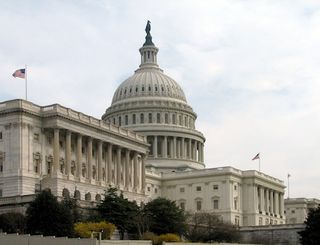House Subcommittee Approves Lifeline Curb Act

A divided House Communications Subcommittee approved by a vote of 17 to 11 the CURB Lifeline Act (HR 4884) along with a handful of other communications-related bills.
Lifeline is the subsidy to low-income residents for advanced telecom, which the FCC is migrating from voice to broadband.
The Lifeline CURB Act caps the Lifeline fund at its current $1.5 billion annually--the FCC voted to increase the subsidy to $2.25 billion and even a Republican-backed compromise would have raised it to $2 billion.
It would also prevent the subsidy--which is $9.25 per month--from being used for a cell phone or other device, and would also end voice-only mobile service subsidies--the FCC proposals phases out voice-only mobile over several years and even then allows for extending that if necessary.
The bill passed after lengthy debate along party lines and after a series of Democratic amendments were voted down. Democrats do not want the program cut or capped, saying it could adversely impact broadband adoption for seniors, vets, and low-income families. One Democratic amendment was adopted. It required the FCC Comptroller General to study whether a cap on the fund discourages waste, fraud and abuse.
Rep. Doris Matsui (D-Calif.), for example, proposed a new version of the bill that Republicans said would lead to more Lifeline spending.
Rep. Frank Pallone (D-N.J.) said Matsui's bill was a preferable alternative to the Republican bill, which he said would eliminate the Lifeline service for the people who need it most. He said, "for the life of him," he did not see why her bill could not be the basis of bipartisan agreement, rather than taking an axe to the program, as he said the Republicans were doing.
Multichannel Newsletter
The smarter way to stay on top of the multichannel video marketplace. Sign up below.
Other amendments would require an FCC study before any cap was imposed and identify categories of people who would be adversely impacted.
Rep. Greg Walden (R-Ore.) chairman of the subcommittee, said he did not think the bill was taking an axe to what he called a very important service. But he pointed to waste, fraud and abuse in the program, which is why he thinks there needs to be a cap. He cited a recent FCC action against a Lifeline abuser as specific evidence,
saying the FCC also allowed the fraudulent activity to continue, some of it beyond the statute of limitations.
Rep. Anna Eshoo (D-Calif.) said the Republicans were trying to rip away the lifeline for the subsidy recipients, and said she did not think that was part of Chairman Walden's DNA. "Why are we hurting these people. What did they ever do to you that you wanted to do this for them. Come on. We really are better than this." She called it a "sad" and "hurtful" effort.
Pallone said he did not see any way a cap would target waste, fraud and abuse or reform the system. He agreed with Eshoo that it would unnecessarily penalize fund recipients. Walden said he did not appreciate being tabbed as not wanting to help the poor. "I've done plenty for the poor," he said."
As to the cap targeting waste, fraud and abuse, Walden said most programs have caps, which are one way to tighten up such programs. He said it is prudent to cap the program as the government works through how to tighten the program, including for those who pay into the subsidy.
Rep. Steve Scalise (R-La.) said struggling single moms are among those paying into the subsidy. He said a cap is needed because each time the fee is raised, it is coming out of the pockets of people just struggling to get by. He said added Universal Service Fund charges are harder and harder to pay for those struggling folks. He called the USF an FCC slush fund going to new, partisan, "whimsical" proposals.
The bill was introduced March 23--in advance of the FCC's Lifeline vote--by Rep. Austin Scott (R-Ga.), and was fast-tracked after a politically divided FCC voted not to cap the fund.
Among the other bills approved, mostly without opposition or debate, was The Spectrum Challenge Prize Act of 2015, a competition to promote greater spectrum efficiency, and the Security Access to Networks in Disasters (SANDy) Act.
“NCTA applauds Ranking Member Pallone and the Members of the Communications and Technology Subcommittee for approval of The Security Access to Networks in Disasters, or SANDy Act," the National Cable & Telecommunications Association said in response. "The legislation recognizes the role the cable industry plays in keeping Americans informed, safe and connected. We especially commend Congressman Pallone for taking lessons learned from Superstorm Sandy’s devastation and updating the law so that the country may better respond to future natural disasters.”
Contributing editor John Eggerton has been an editor and/or writer on media regulation, legislation and policy for over four decades, including covering the FCC, FTC, Congress, the major media trade associations, and the federal courts. In addition to Multichannel News and Broadcasting + Cable, his work has appeared in Radio World, TV Technology, TV Fax, This Week in Consumer Electronics, Variety and the Encyclopedia Britannica.

